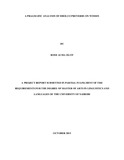| dc.description.abstract | This study set out to examine the pragmatics of Dholuo proverbs on women. It sought to answer three key questions, namely: What is the dominant community perception of women as reflected in the proverb? In what context are the proverbs used? How does relevance theory account for how the hearer understands the proverbs? Relevant research objectives and hypotheses were formulated to guide the research conducted within the theoretical perspectives of Relevance Theory. Using interactive data collection methods, fifty two proverbs were collected and classified into four categories, namely: the woman as a daughter; the woman as a wife; the woman as a female; the woman as a mother. These were finally subjected to a relevance-theoretic analysis. The results revealed that: There are stereotypical proverbs about women in the Luo society; the majority of the proverbs are demeaning to the woman; cultural context is the right cognitive environment needed to process the proverbs; relevance theory adequately accounts for how the hearer understands the proverb among the Luo speakers. Further research could be conducted to examine how men are portrayed in proverbs within the same society. | en_US |

